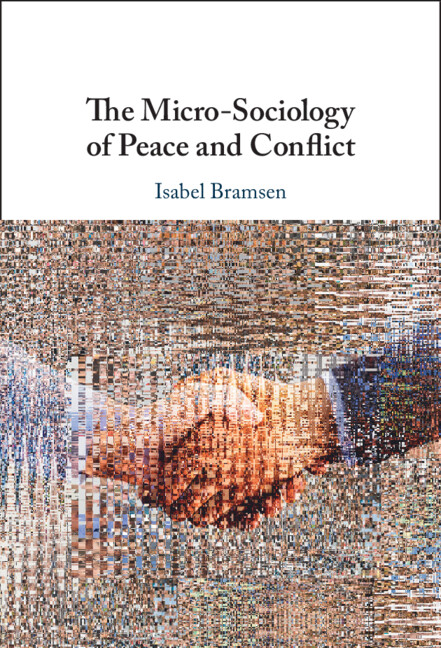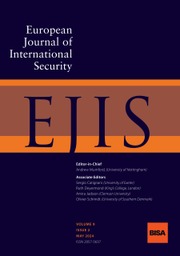The Micro-Sociology of Peace and Conflict
How do micro-interactions of resistance, fighting and dialogue shape larger patterns of peace and conflict? How can nonviolent resistance, conflict transformation and diplomacy be analyzed in micro-detail? Exploring these questions, Isabel Bramsen introduces micro-sociology to Peace Research and International Relations. Breaking new methodological, empirical and theoretical ground, Bramsen develops a novel theoretical and analytical framework for analyzing micro-dynamics of peace and conflict. The book features chapters on the methods of micro-sociology (including Video Data Analysis) as well as analytical chapters on violence, nonviolence, conflict transformation, peace talks and international meetings. It is at once broad and specific, analyzing a wide variety of phenomena and cases, while also introducing very specific lenses to analyzing peace and conflict. Presenting a highly practical and micro-detailed approach, The Micro-Sociology of Peace and Conflict will be of use to students, researchers, practitioners, activists and diplomats interested in understanding and addressing contemporary conflicts. This title is also available as open access on Cambridge Core.
- A comprehensive introduction to the micro-sociological method and theoretical framework for studying peace and conflict studies
- Offers a unique structure featuring a more empirically and practically detailed account of peace and conflict than other books on the topic, making it suitable for scholars and students as well as practitioners, activists and diplomats
- Draws upon case studies of contemporary conflicts and conflict resolution processes such as the Arab Uprisings, the Philippine Peace talks and discussions in the UN Security Council
- This book is also available as open access
Reviews & endorsements
'Isabel Bramsen has more first-hand knowledge than almost anyone of uprisings, civil wars, and the practical business of peace-making. She also provides the most advanced version of interaction ritual theory, synthesized with a general theory of micro-sociology, and puts it to work explaining the flow of events along the spectrum of war and peace. Above all, she explains when and how people acquire social agency, the power to shape the turning points of history.' Randall Collins, Author of Explosive Conflict: Time-Dynamics of Violence
'This is a wonderful comparative exploration of the power of micro-dynamics in conflict-affected contexts. It helps us better understand the stickiness of conflict, but also how individuals, communities and elites can navigate their way through it. Bramsen convincingly makes the case that empathy and human social interactions matter. This is a career-defining book and is highly recommended.' Roger Mac Ginty, Professor, School of Government and International Affairs, Durham University
'In this remarkable book, Bramsen theorizes and empirically documents the political effects of microsociality in peace processes and world politics writ large. Her useful methodological innovations (especially video data analysis) and rich theoretical insights about the rhythm and script of everyday interaction open promising research avenues in international practice theory, peace and conflict studies, and beyond. Perhaps counterintuitively for some, the book shows that not only friendly but also conflictual interaction can be part of peace!' Vincent Pouliot, James McGill Professor, Department of Political Science, McGill University
'Isabel Bramsen eloquently weaves together traditional Peace and Conflict Research theories with recent thinking on corporeality, rhythm of interaction and emotional exchange. Her groundbreaking work not only develops a highly innovative analytical framework for studying conflict transformation but also offers a fascinating empirical analysis of how corporeal interactions work and develop in peace and conflict.' Tarja Väyrynen, Professor, Tampere Peace Research Institute (TAPRI) and Vice-chair, Research Council for Culture and Society
'… this work does two things exceptionally well: it provides a detailed description of micro-sociology theory and process in the context of social movements, and it operationalizes micro-sociological analysis through the use of visual data (photographic and video), illustrating their analytical usefulness in contexts such as the Arab Spring uprisings of 2011 and the Northern Ireland peace process … Highly recommended.' S. P. Duffy, CHOICE
'Bramsen offers … strategies that will prove useful for students and researchers who adopt the micro-sociological approach to peace and conflict.' Anastasia Shesterinina, International Affairs
Product details
November 2023Hardback
9781009282697
220 pages
234 × 158 × 20 mm
0.53kg
Available
Table of Contents
- Introduction
- 1. The theory of micro-sociology
- 2. The methods and methodology of micro-sociology
- 3. The micro-sociology of violence
- 4. The micro-sociology of nonviolent resistance
- 5. The micro-sociology conflict transformation
- 6. The micro-sociology of peace talks
- 7. The micro-sociology of international meetings
- Conclusion.






